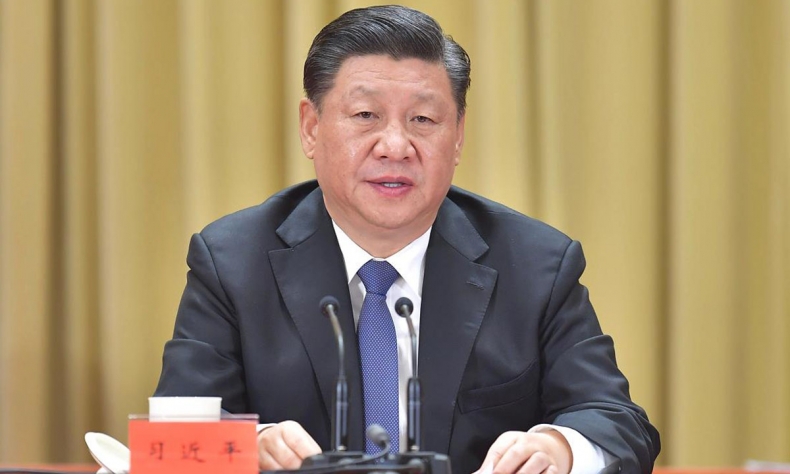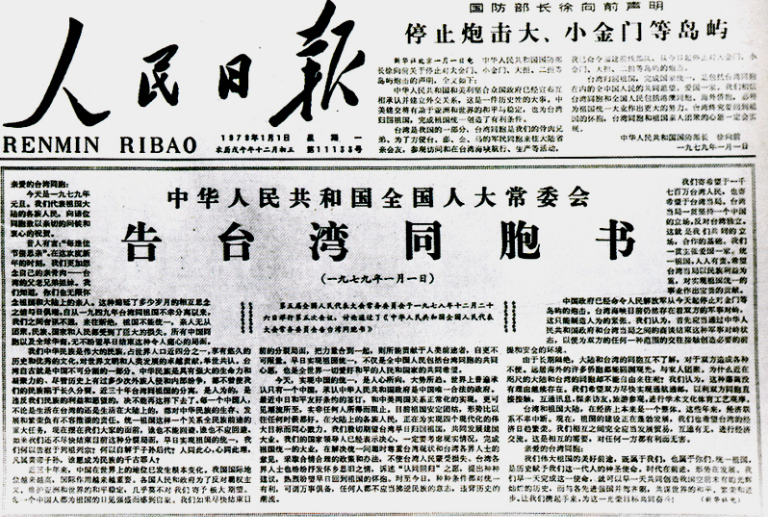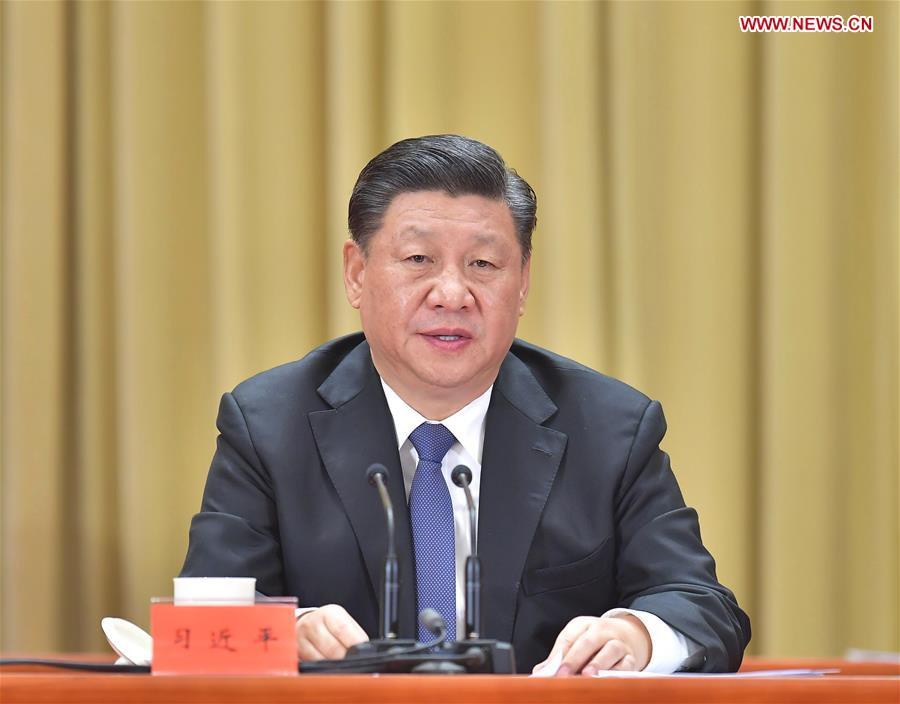China’s reunification clock is ticking

The clock of national reunification is ticking, and it is becoming more urgent.
Chinese President Xi Jinping, also general secretary of the Communist Party of China (CPC) Central Committee and chairman of the Central Military Commission, delivered a speech at a gathering to commemorate the 40th anniversary of issuing Message to Compatriots in Taiwan, at the Great Hall of the People in Beijing, capital of China, Jan. 2, 2019.

On January 1st 1979, the Standing Committee of the National People’s Congress issued the “Message to Compatriots in Taiwan,” solemnly proclaiming the major policy of striving for peaceful reunification of the motherland and the development of cross-strait relations, thus unveiling a new chapter in history. The publication of the “Message” showed that China’s intentions and methods for solving the issue of Taiwan had entered a new historical period.
At the gathering, Xi Jinping proposed exploring the “two-system” Taiwan program and enriching the practice of peaceful reunification. This again marks the development of cross-strait relations and shows that the policy of fulfilling national reunification has entered a “new era.”
Over the past seven decades, the development of cross-strait relations has experienced many twists and turns. Over the course of history; war, peace-making, negotiations, consultations, and development of economic, trade, travel and cultural exchanges have all been used by the central government as necessary pathways towards national reunification. These pathways have played an important role during certain periods, at certain stages, and for certain problems, and of course have historical limitations. National reunification is a major problem that many countries have faced, in ancient and modern China, at home and abroad. After the cross-straits division caused by the civil war, both sides have experienced different trajectories over the past seven decades.
Since 1979, the CPC Central Committee and the Central Government have consistently adhered to the principles of “peaceful reunification”and “one country, two systems” to solve the Taiwan issue. It regards the realization of national reunification as imperative for the great rejuvenation of the Chinese nation.
From January 1st 1979, Deng Xiaoping led the issuing of the “Message to Compatriots in Taiwan”; on September 30th 1981, Ye Jianying, chairman of the Standing Committee of the National People’s Congress, announced the intention for Taiwan’s return to the motherland to achieve peaceful reunification (i.e. Ye’s nine points).
On January 30th 1995, Chinese president Jiang Zemin, further elaborated on Deng Xiaoping’s thoughts on “peaceful reunification” and “one country, two systems”(Jiang’s 8 points).
On December 31st 2008, President Hu Jintao put forward a series of new important conclusions and propositions (Hu’s 6 points). On October 18th 2017, Xi Jinping pointed out in the report of the 19th National Congress of the Communist Party of China that “adhering to ‘one country, two systems’ and promoting the reunification of the motherland” is one of the fourteen basic strategies for Chinese socialism to be adhered to and developed in the new era.
On January 2nd 2019, Xi Jinping proposed a program of “two systems” under the “peaceful reunification” and “one country, two systems” approach. Several generations of the central government leaders have devoted themselves to solving the Taiwan issue and achieving national reunification.
In the 1980s, the former leader of the Taiwanese region, Chiang Ching-kuo, proposed a mainland policy of “no contact, no negotiation, no compromise,” but still advocated national reunification. In 1999 Lee Teng-hui (former leader of the Taiwan region and the successor of Chiang Ching-kuo) threw out the “two-state theory” and positioned cross-straits relations as “the relationship between the state and the state, at least the special state-to-state.” In 2002, Chen Shui-bian (former leader of the Taiwanese region and former chairman of the Democratic Progressive Party,) announced “one side, one state” and promoted Taiwan as a “sovereign and independent country.”
The current leader of the Taiwanese region and chair of the DPP, Tsai Ing-wen, who took office in 2016, refused to recognize the “maintenance” of the “1992 Consensus” and, on January 1st 2019, said she did not know of the so-called “Republic of China/Taiwan” concept in her New Year’s Day speech. The intention for national reunification from the leaders of the Taiwanese region has gradually drifted away, and the idea of “Taiwan independence” has become more and more advanced.

The mainland, which holds the dominant power in cross-straits relations, is advanving the clock for national reunification. CPC General Secretary Xi Jinping’s speech at the 40th anniversary of the “Message” called for “China’s strongest voice” for the reunification of the new era.
On the one hand, “China must be, will be reunified.” General Secretary Xi Jinping declared to the world the determination and confidence of the central government to resolve the Taiwan issue and achieve national reunification. And he solemnly promised to the world, “On the basis of ensuring China’s sovereignty, security and interests of development, the social system and way of life in Taiwan will be fully respected, and the private property, religious beliefs and legitimate rights and interests of Taiwan compatriots will be fully protected after peaceful reunification is realized.”
On the other hand, based on adhering to the “1992 Consensus” and opposing “Taiwan Independence,” the CPC Central Committee sent a sincere invitation to all circles in Taiwan. President Xi Jinping proposed that the mainland and Taiwan conduct democratic consultation on cross-Straits relations and the future of the nation, and establish institutional arrangement for peaceful development of cross-Straits relations.
Political parties and all sectors on both sides of the Straits may recommend representatives to conduct extensive and in-depth democratic consultation on the basis of the common political foundation of upholding the 1992 Consensus and opposing “Taiwan independence,” Xi said.
In his New Year Message, President Xi Jinping quoted Kong Rong: “Time stops for no one, and the seasons keep changing.” The clock of national reunification is ticking, and it is becoming more urgent. We hope that the leaders of Taiwan will recognize history and grasp the present, and that the people on both sides of the straits will work together to create a future of national reunification.
Written by Zhang Jian, scholar of Shanghai Institute for International Studies
 Facebook
Facebook
 Twitter
Twitter
 Linkedin
Linkedin
 Google +
Google +










